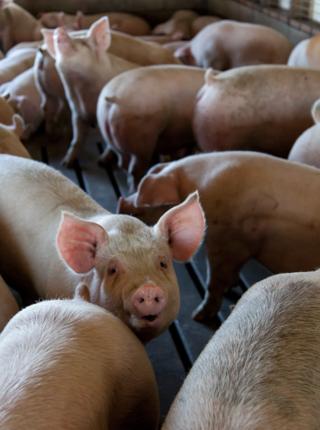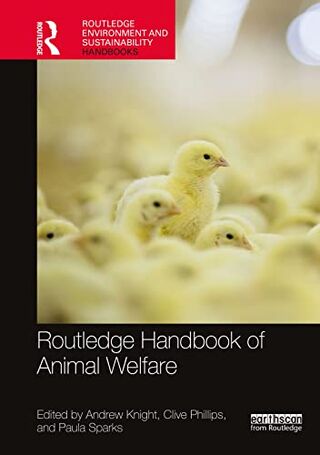Attention
The State of the Art of Animal Welfare Science
A new book about numerous aspects of animal welfare merits worldwide attention.
Posted July 25, 2022 Reviewed by Devon Frye

Globally, non-human animals (animals) need all the help they can get in an increasingly human-dominated world. A new edited volume titled the Routledge Handbook of Animal Welfare edited by animal welfare experts Professors Andrew Knight, Clive Phillips, and Paula Sparks comprehensively reviews the welfare of animals in the wide array of settings in which they are used, including emerging issues such as the impacts of intensive farming and the wildlife trade on climate change, biodiversity loss, and antimicrobial resistance and pandemics.1,2
Here's what Andrew had to say about this most valuable and comprehensive source of up-to-date information written for a global audience.
Marc Bekoff: Why did you decide to publish the Routledge Handbook of Animal Welfare?
AK: Informed by recent advances in animal behavior and the cognitive sciences, a new understanding of the remarkable abilities of a wide range of animals has led to a fundamental reconsideration of the ways in which we use, and sometimes exploit, other species. This has challenged accepted practices, throwing into sharp relief the differing interests of stakeholders such as industry, government, wider society, and of course, the animals themselves.
In such a socially contested domain, sound evidence is important. This book explores the scientific underpinnings for the moral consideration of animals and of evolving conceptualizations of animal welfare that give rise to concerns about the welfare of animals used in a wide variety of settings.

MB: How does your book relate to your background and general areas of interest?
AK: I come from Perth, Western Australia, the world capital of the live sheep trade. Ever since helping launch Australia’s campaign against live sheep exports in the early 1990s, I have tried to advocate for animals. For nearly a decade prior to 2012, I practiced veterinary medicine, mostly around London. In 2013, I was recruited into academia. I now lead the very active Centre for Animal Welfare at the University of Winchester in the UK, where we provide several distance learning and conventional animal welfare degrees.
In my decades trying to advance animal interests, it’s been clear to me that there is a strong need for a science-based textbook that comprehensively reviews the full range of animal welfare issues, along with key related areas such as animal law, ethics, and human behavioural change—and further, that supports the really significant calls for change that are warranted in many areas. This textbook was created to support these needs. I hope and expect it will become a key resource for animal welfare advocates globally.
MB: Who is your intended audience?
AK: Our textbook will become a key resource for policy-makers, researchers, and other professionals working in the animal welfare sector, and for students of animal welfare around the world.
MB: What are some of the topics you weave into your book and what are some of your major messages?
AK: Combining the expertise of 50 authors, many of whom are world leaders in their fields, the Routledge Handbook of Animal Welfare comprehensively covers animal welfare concerns associated with the farming of terrestrial species and fish, transportation, slaughter, the use of animals in laboratories, zoos, entertainment settings, and as companions, working animals, and more. Virtually all contemporary animal welfare issues are covered in depth.
The inclusion of recent topics such as the impacts of climate change on animal welfare, and the links between animal exploitation, antimicrobial resistance, and pandemics, ensure this text is among the most current in its field. This textbook also includes coverage of animal ethics, animal law in key regions of the world, stakeholder perspectives, education, communication, and human behavioral change.
MB: How does your book differ from others that are concerned with some of the same general topics?
AK: Numerous books about animal welfare have been published over the last 15 years, indicating the strength of interest in this field. However, most are either insufficiently based on scientific evidence, weakening their credibility, or else, typically those with a strong scientific basis, fall short of seriously critiquing animal use practices. Calls for abolition or wholesale reform are usually lacking, even when well justified by the evidence. This text has the courage to make such calls, and is unpinned by a very strong evidence base, ensuring its conclusions are robust.
MB: Are you hopeful that as people learn more about the science of animal welfare they will treat nonhumans better?
AK: Let’s step back for a moment, and place life into context. If you think about it, the universe is almost entirely empty. It is unimaginably vast, and virtually silent. Very rarely is that emptiness broken by dust, stars, or planets. Rarer still are planets that could support life, and to our knowledge the incredible complexity of living creatures exists only on our own planet.
This should fill us with a sense of wonder, deep appreciation, and the desire to conserve our planetary life support systems and the incredible diversity of living creatures they support. Instead, we have created the sixth mass extinction event since fossil records began, a short time period within which the majority of the world’s living creatures are being wiped out.
By reviewing the remarkable characteristics of many animal species that provide a strong basis for affording them moral consideration, we hope readers will come to value animals as highly as they deserve. And by comprehensively reviewing the many ways we humans exploit and harm those same animals, as well as the reforms to practice and policy needed to address these, we hope readers will come to appreciate and support the changes needed to bring about a better world, in which the interests of animals are better protected.
References
In conversation with Andrew Knight, Professor of Animal Welfare and Ethics, and Founding Director of the Centre for Animal Welfare, at the University of Winchester, UK. He is also an Adjunct Professor in the School of Environment and Science at Griffith University, Australia. Prior to working in academia, he practised veterinary medicine for nearly a decade. Biographies for all three editors can be seen here,
1) The book's description and table of contents can be seen here.
2) For contrasting views of the science of animal welfare and the science of animal well-being, click here and see The Animals' Agenda: An interview About Animal Well-Being and The Animals' Agenda: Freedom, Compassion, and Coexistence in the Human Age.
It’s Time To Stop Wondering if Animals Are Sentient—They Are,
Research Shows Brainy Parrots Have Unique Welfare Needs.
Animal Welfare in China: Tradition, Facts, and Fiction.
New Zealand Continues to Have Major Animal Welfare Issues
Animal Welfare in a Changing (and Increasingly Human) World.
Snake Welfare: They Need to Straighten Bodies, Science Says.
Animal Welfare Fails Many Millions of Sentient Individuals.
The Animal Welfare Act Claims Rats and Mice Are Not Animals.
Encyclopedia of Animal Rights and Animal Welfare. Second Edition, Greenwood, 2010.
Encyclopedia of Human-Animal Relationships: A Global Exploration of Our Connections with Animals. Greenwood, 2007.




